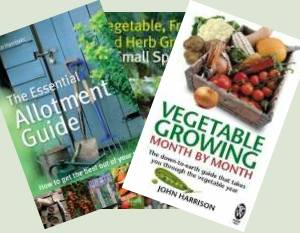A few hours of good weather had my son-in-Law Gary helping me turn over the compost bins, my back is still playing up so I’ll take any help offered! Although the HotBin is doing well the other compost bins have all noticeably slowed down in the colder weather; when things slow down I like to give them boost with a compost accelerator.
 Home Made Compost Benefits
Home Made Compost Benefits
Home composting is a valuable, environmentally friendly process that reduces the amount of waste sent to landfill and provides a nutrient-rich, organic fertiliser for your garden. In my opinion every gardener should try and maintain their own compost bins; trust me you will need a lot of compost for growing on your plot!
There are multiple reasons why you should consider composting:
- It’s simple and cost-effective: Making compost is easy, and once you have bought your compost bin, it’s essentially free. Or to save more money, build your own bin following our How to Build a Compost Bin Guide.
- Reduces landfill waste: Organic waste makes up a significant portion of landfill waste. By composting at home, you can reduce the amount of waste you contribute to landfills.
- Improves soil health: Compost adds essential nutrients to your soil, improving its structure, fertility, and water-holding capacity.
- Supports plant growth: Plants love compost! It provides them with the nutrients they need to thrive.
- Educational: Composting is a great way for children (and adults!) to learn about the natural decomposition process and the importance of recycling.
- Fun: Yes, composting can be fun! There’s something satisfying about turning waste into a valuable resource.
How is Compost Made?
Homemade compost results from the microbial and fungal breakdown of materials, aided by worms and oxygen in a process known as aerobic digestion. This differs from anaerobic digestion utilized by commercial plants for energy production from food wastes, manures, and specific crops like maize.
Microbes in your compost bin need a nitrogen-to-carbon ratio of 1:25 to function optimally. Nitrogen-rich materials include grass cuttings, plants, fruits, and vegetables, whereas carbon-rich materials include dry leaves, sticks, paper, and eggshells.
The time required for composting depends on various factors, including seasonal temperature variations and the size of the materials. Smaller, shredded pieces decompose more rapidly than larger ones. Typically, composting occurs faster during warm summer months, averaging about six-eight weeks; whereas winter composting may take three to four months, sometimes more.
What Can You Compost?
You can compost a wide range of organic waste materials, including:
- Fruit and vegetable scraps and peelings
- Coffee grounds and tea bags
- Grass cuttings and dead leaves
- Old flowers and plants
- Shredded cardboard and paper
- Eggshells
- Pet droppings from veg-eating pets (e.g., rabbits, gerbils, poultry)
Turning Your Compost & Boosting Your Compost Bin
Turning your compost is an essential step in the composting process. It helps to aerate the compost, which speeds up the decomposition process and prevents your compost pile from developing an unpleasant odour. You should aim to turn your compost once a month, but more often won’t hurt.
To hasten composting during colder months, using a compost accelerator can be highly beneficial. You will notice that even with regular turning over of the compost bins that, from September through to February, your bin slows down.
- Envii Compost Accelerator and 5 litre Watering Can
- Preparing The Compost Bin
- Adding Compost Accelerator
Using a Compost Accelerator
 The Envii Compost Accelerator that I use is formulated with a mix of nutrients, specialised bacteria, and other natural, organic components. These unique nutrients promote the growth of bacteria and increase the internal temperature of your compost pile, facilitating the decomposition and sterilisation of garden waste. As a result, you’ll enjoy nutrient-rich, organic compost in just three weeks instead of waiting months.
The Envii Compost Accelerator that I use is formulated with a mix of nutrients, specialised bacteria, and other natural, organic components. These unique nutrients promote the growth of bacteria and increase the internal temperature of your compost pile, facilitating the decomposition and sterilisation of garden waste. As a result, you’ll enjoy nutrient-rich, organic compost in just three weeks instead of waiting months.
It is very simple to use. Just add 1 tablet of accelerator to 5 litres of warm water and leave for an hour to fully dissolve. Once the tablet has dissolved, pierce the middle of your heap with a garden fork and pour in the water. All you have to do then is leave it to work its magic! After a week turn your bin over and within 3 weeks you will notice a big difference in your compost.
Each packet of Compost Accelerator contains 12 tablets capable of treating up to 1,800 litres of compost. Envii take the environment seriously and are putting a lot of effort into ecologically friendly packing. You can read more about this on their sustainability page
Composting is a simple and effective way to reduce waste, improve your garden soil, and help the environment. By understanding the basics of composting, you can turn your kitchen scraps and garden waste into a valuable resource for your allotment plot. Happy composting!







Leave a Comment Here on Slowed Down Compost Bin – Using a Compost Accelerator